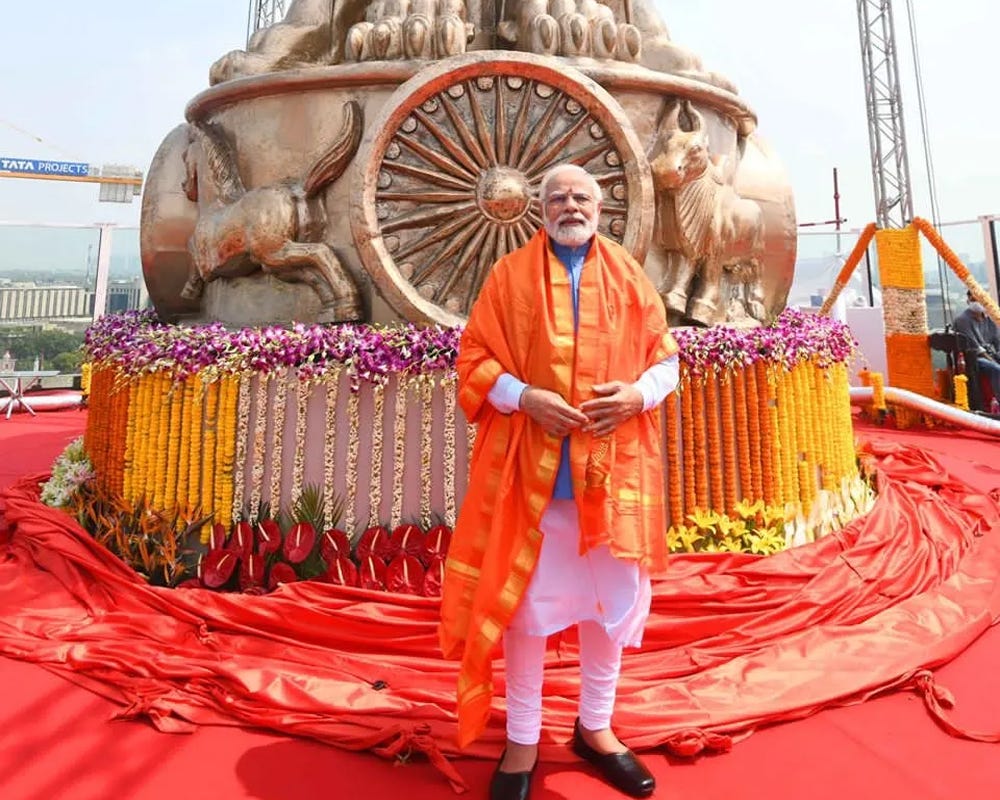The Triumph of Truth: When Truth Alone Trumps
Triumph of Truth: Intertwining Technology, Media Literacy, and Ethical Responsibility to Trump Misinformation in Public Space.
The immutable truth: In a world where the pursuit of truth often contends with a barrage of falsehoods and half-truths, there arises a new rallying cry: "Truth alone trumps." With a slight alteration to the timeless adage, “Truth alone triumphs” (सत्यमेव जयते), the power and supremacy of truth are accentuated, elevating it to an unassailable pedestal. In this paradigm, truth becomes a beacon of unwavering conviction, capable of overcoming the tumultuous tide of deceit, prevailing over all other considerations. Can we embark on a transformative journey that explores the indomitable spirit of truth? And, witness its triumph over falsehood and the profound impact it wields in shaping a just and righteous world.
"Truth alone triumphs" is the motto of India, derived from the Sanskrit phrase "Satyameva Jayate" It holds significant cultural and philosophical importance in the Indian context. The phrase is taken from an ancient Indian scripture called the Mundaka Upanishad, which is a part of the Vedic texts.
In the Indian context, "Truth alone triumphs" emphasizes the value and power of truth. It signifies the belief that truth will ultimately prevail over falsehood and that justice and righteousness will triumph over deceit and dishonesty. It encourages individuals to uphold and pursue the truth in all aspects of life. The motto reflects the core principles of Indian philosophy, particularly the concept of Dharma, which encompasses righteousness, moral duty, and cosmic order. It aligns with the Indian ethos, which places a strong emphasis on truth, honesty, and integrity.
"Truth alone triumphs" is also associated with India's independence movement and its struggle against colonial rule. It served as a rallying cry for truth, justice, and freedom during that time, symbolizing the nation's aspirations for independence and the pursuit of truth as a means to achieve social and political progress.
Overall, this motto serves as a reminder to individuals and society at large to embrace and uphold truth in their thoughts, words, and actions, believing that it is the path to righteousness, justice, and ultimately, success.
Truth alone trumps: The phrase "Truth alone trumps" with the substituted word "trumps" implies that truth is not just victorious but surpasses or prevails over all other factors or considerations. The word "trumps" suggests that truth holds ultimate authority and superiority in any situation.
In this altered version, the emphasis is on the absolute supremacy of truth. It signifies that truth is the highest and most powerful value, capable of overcoming and overshadowing any competing ideals, opinions, or falsehoods. It implies that truth has the ability to triumph over deceit, falsehood, ignorance, and manipulation.
The modified version of the phrase could convey a sense of certainty and conviction in the power of truth. It suggests that when truth is upheld and recognized as the ultimate guiding principle, it has the ability to overcome any challenges, obstacles, or attempts to distort it.
Overall, "Truth alone trumps" emphasizes the unwavering authority and superiority of truth, emphasizing its ability to prevail and triumph over all other factors, ideas, or influences. It underscores the significance of truth as a guiding principle for making decisions, seeking justice, and achieving moral and intellectual clarity.
With specific reference to politics in India, truth assumes paramount significance as the backbone of a vibrant democracy. Mahatma Gandhi once proclaimed, "Truth never damages a cause that is just." In the realm of politics, this statement resonates profoundly, emphasizing the necessity of truthfulness for a just and equitable society. In India, a nation rooted in democratic principles, the pursuit of truth in politics becomes even more imperative. It demands that political leaders embody Gandhian values of transparency, accountability, and integrity, transcending personal gain and vested interests. Only by embracing truth as the bedrock of political discourse can India realize its aspirations of a truly inclusive, harmonious, and prosperous nation.
In the historical and religious context, the importance of truth finds resonance in the teachings of revered figures such as Buddha and Guru Nanak. Buddha, the enlightened one, imparted timeless wisdom, stating, "Three things cannot be long hidden: the sun, the moon, and the truth." This insightful quote reflects the universal nature of truth and its inherent power to eventually prevail, no matter how concealed it may seem.
Similarly, Guru Nanak, the founder of Sikhism, emphasized the significance of truth, proclaiming, "Truth is high, higher still is truthful living." This profound statement underscores the essence of living in alignment with truth, emphasizing that it is not merely an abstract concept but a guiding principle that should permeate every aspect of our lives.
In the modern-day context, the teachings of Buddha and Guru Nanak offer invaluable lessons. They remind us that truth is not fleeting; it is an enduring force that cannot be suppressed indefinitely. As individuals, we are called to embody truth in our thoughts, actions, and interactions, cultivating a society rooted in honesty, compassion, and justice. Embracing truth in the face of misinformation, propaganda, and deceit becomes all the more crucial in the digital age, where the spread of information can be both empowering and manipulative. By staying committed to truth and seeking it with discernment, we can navigate the complexities of our world, contribute to the betterment of society, and foster a more harmonious and enlightened collective existence.
Truth in the age of “fake news”: “Fake news” is a major challenge to truth. Addressing the pressing challenge of fake news, rumors, disinformation, and misinformation in the digital age requires a multifaceted approach. While technological advancements and fact-checking mechanisms play a crucial role in curbing the spread of falsehoods, tackling this issue cannot solely rely on legal measures or governmental regulations. Heavy-handed approaches that criminalize "fake news" risk compromising free speech and hindering the open exchange of ideas. Instead, a comprehensive solution necessitates promoting media literacy, fostering critical thinking skills, and cultivating an ethical responsibility among individuals to verify information before sharing it. By collectively embracing these efforts, we can safeguard the integrity of public discourse, preserve democratic values, and nurture a more informed and enlightened global society.
Conclusion: As we reflect on the intertwining of these two slogans, "Truth alone triumphs" and its altered counterpart, "Truth alone trumps," we uncover a profound essence that extends beyond the realms of Indian polity. They beckon us to embrace truth not only as a guiding principle in our governance systems but also as an integral part of our very existence. By upholding the unwavering pursuit of truth in our personal lives, interactions, and decision-making processes, we align ourselves with the timeless wisdom of these slogans. In weaving truth into the fabric of our society and individuality, we pave the way for a world that cherishes honesty, integrity, and justice, fostering a collective triumph that reverberates across nations, generations, and the human spirit. Let us heed these slogans as a call to action, transforming truth from an abstract ideal to a lived reality that shapes a brighter future for all.
______________________________________________________________
KBS Sidhu. The Author is an IAS officer of 1984 Batch of Punjab cadre, and retired from service in July 2021, as Special Chief Secretary, Punjab, after 37 years of service.
Photos off the Internet. Their copyright acknowledged.
He can be reached on kbs.sidhu@gmail.com or @kbssidhu1961 or https://www.facebook.com/kbs.sidhu





